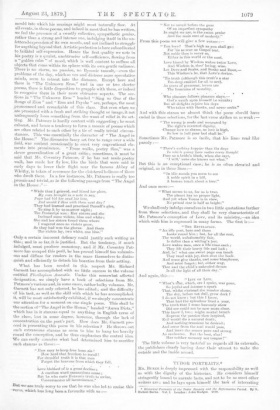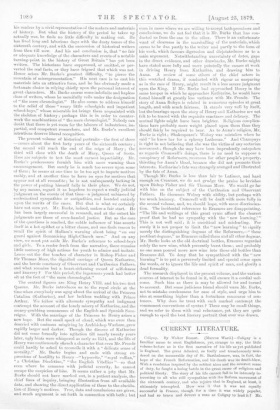:TUDOR PORTRAITS.* MR. BURKE is deeply impressed with the responsibility
as well as with the dignity of the historian, Ile considers himself stringently bound to narrate facts, and not to be as most other writers are ; and he lays upon himself the task of interesting .0 Historical Portraits o,' the Tudor Dynasty and the &formation Period. By S. Hubert Burke. Vol. 1. Louden : Johu Hodges. 1579.
his readers by a vivid representation of the makers and materials of history. But what the history of the period he takes up actually was, ho finds no little difficulty in making out. He has lived long and laborious days with the dusty tomes of the sixteenth century, and with the succession of historical writers from then till now. And his sad conclusion is, that " no fair or adequate knowledge of the characters and events of a notable turning-point in the history of Great Britain " has yet been written. The historians have suppressed, or omitted, or per- verted the real facts, or they have feigned that which was not. Hence arises Mr. Burke's greatest difficulty, " to pierce the mountain of misrepresentation." His next care is to cast his materials into an attractive form, and he has obviously made a fortunate choice in relying chiefly upon the personal interest of
great characters. Mr. Burke scorns some indefinite and hapless
class of writers, whom he mercifully veils under the designation of " the mere chronologist." He also seems to address himself to the relief of those "weary little schoolgirls and impatient school-boys," whose miserable lot brings them acquainted with the skeleton of history ; perhaps this is in order to counter- work the machinations of " the mere chronologist." Nobody can doubt that there is yet room for the labours of industrious, im- partial, and competent researchers, and Mr. Burke's excellent intentions deserve liberal recognition.
The present volume of historical portraits—the first of three —covers about the first forty years of the sixteenth century ; the second will reach the end of the reign of Mary ; the third will close with the death of Mary, Queen of Scots. Here are subjects to test the most earnest impartiality. Mr. Burke's predecessors furnish him with more warning than encouragement. But surely he is much too severe upon some of them ; he seems at one time to be too apt to impute motives rashly, and at another time to have no eyes for motives that appear not at all recondite ; he is not unfrequently lacking in the power of putting himself fully in their place. We do not, by any means, regard it as hopeless to expect a really judicial judgment on the events of that time—a judgment unbiassed by ecclesiastical sympathies or antipathies, and founded entirely upon the merits of the cases. But that is what we certainly have not seen yet. Mr. Burke, indeed, makes a fair start. He has been largely successful in research, and at the outset his judgments are those of even-handed justice. But as the core of the questions is reached, the subtle influence of bias asserts itself in a hot epithet or a bitter clause, and one 'finds reason to recall the spirit of Hallam's warning about being "on our guard against Romanising High-Church men." And on any view, we must put aside Mr. Burke's reference to school-boys and girls. To a reader fresh from the narrative, there remains little memory of high actions for youth to admire and imitate. Leave out the fine touches of character in Bishop Fisher and Sir Thomas More, the dignified carriage of Queen Katharine, and the heroic constancy of Observant and Carthusian Fathers, and what remains but a heart-sickening record of selfishness and knavery P For this period, the ingenuous youth had better sit at the feet of " the mere chronologist."
The central figures are King Henry VIII. and his two first Queens. Mr. Burke introduces us to the royal circle at the time when everybody was agog about the arrival of the Princess Catalina (Katharine), and her luckless wedding with Prince Arthur. We follow with alternate sympathy and indignant contempt the account of the lonely misery of Katharine, and the money-grubbing meannesses of the English and Spanish Sove- reigns. With the marriage of the Princess to Henry arises a new hope. But the small speck of cloud, which was even then descried with ominous misgiving by Archbishop Warliam, grew rapidly larger and darker. Though the divorce of Katharine did not come formally into agitation till nearly twenty years later, ugly hints were whispered as early as 1514, and the life of Henry was continuously oisuch a character that even Mr. Fronde could hardly be asked to reconcile it with a " delicate sense of morality." Mr. Burke begins and ends with strong ex- pressions of hostility to Henry—" hypocrite," "royal ruffian," " a Christian Diocletian," " the English Vitellius "—so that even where he censures with judicial severity, ho cannot escape the suspicion of bias. It seems rather a pity that Mr. Burke should not have marked out, in a patient analysis, the chief lines of inquiry, bringing illustration from all available data, and showing the direct application of these to the elucida- tion of Henry's motives. True, data and conclusions are given, and much argument is set forth in connection with both ; but
even in cases where we are willing to accept both premisses and conclusions, we do not feel that it is Mr. Burke that has con- ducted us from the one to the other. There is an unfortunate want of clearness in the marshalling of the materials, which seems to be due partly to the writer and partly to the form of his work, which favours digression and disjointedness as to a main argument. Notwithstanding uncertainty of dates, gaps in the direct evidence, and other drawbacks, Mr. Burke might have stated more fully and more pointedly the causes at work in driving Henry from Katharine, and drawing him to- Anna. A review of some others of the chief actors in this wretched drama, if conducted with rigour as unsparing as in the case of Henry, might result in a less severe judgment upon the King. If Mr. Burke had approached Henry in the same temper in which he approaches Katharine, he would have found himself at greatly less variance with Mr. Froude. The story of Anna Boleyn is related in numerous episodes at great length, and with much fairness. It stands very well by itself, but the bearings upon the story of Henry and Katharine are not felt to be traced with the requisite exactness and delicacy. The mutual lights might have been brighter. Religious complica- tions have probably more weight placed upon them than they should fairly be required to bear. As to Anna's religion, Mr. Burke is right; Shakespeare's Wolsey was mistaken when he- said " he knew her for a spleeny Lutheran." And Champuys is.right in not believing that she was the victim of any sectarian movement ; though she may have been imprudently outspoken as regards Cromwell's doings, there is no need to suppose a conspiracy of Reformers, ravenous for other people's property, thirsting for Anna's blood, because she did not promote their interests. Katharine's fate was strangely avenged and illustrated by the fate of Anna.
Though Mr. Burke is less than fair to Latimer, and hard enough on Cranmor, we do not grudge the praise he lavishes upon Bishop Fisher and Sir Thomas More. We would go far with him on the subject of the Carthusian and Observant Fathers. He discusses Wolsey with ability, but perhaps with too much leniency. Cromwell will be dealt with more fully in the second volume, and, we should hope, with more discrimina- tion. The incidental references to Erasmus are disappointing. " The life and writings of this great cynic afford the clearest proof that he had no sympathy with the new learning.' This is not well said ; it is uncritical and misleading. For surely it is not proper to limit the "new learning" to signify merely the distinguishing dogmas of the Reformers,—" these pestilent dogmas," as Erasmus called them and all other dogmas.. Mr. Burke looks at the old doctrinal bottles, Erasmus regarded solely the new wine, which presently burst them ; and probably no one man poured more new wine into those old bottles than Erasmus did. To deny that he sympathised with the " new learning" is to put a perversely limited and special sense upon the words, or to ignore the life and spirit of man, and glorify a dead formality.
The research displayed in the present volume, and the various sources of interest to be found in it, will ensure it a cordial wel- come. Such bias as there is may be allowed for and turned to account. But some judicious friend should warn Mr. Burke, not to mistake carelessness for ease of style, and urge him to aim at something higher than a fortuitous concourse of sen- tences. Why does he treat with such marked contempt the commonest conventions of syntax P These may be small things, and we refer to them with real reluctance, yet they are quite eueugh to spoil the best literary portrait that ever was drawn.































 Previous page
Previous page